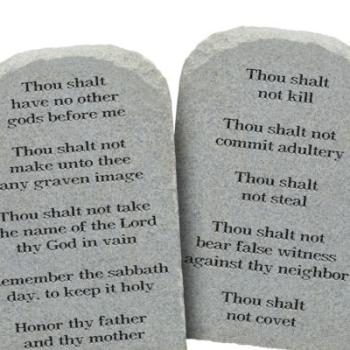The Law: Abolished or not? What does Scripture say?
You asked your new neighbors out to dinner for Friday evening, but they declined. They explained it’s the Sabbath and they’d prefer to be home at sundown. Besides that, no regular work is to be done on the Sabbath, and no one, such as the server at a restaurant, should have to work for them
“You’re Jewish?” you ask. It doesn’t matter to you either way, but you are curious.
“No,” they reply. “We believe in Jesus.”
“Then you don’t need to keep the Sabbath,” you explain. “Jesus is our rest.”
Your neighbors smile. “How many commandments are there?”
“Ten,” you say with confidence.
“Exactly,” they reply. “There are ten, but so many believers ignore number four.” They turn and walk away.
You stand in the driveway scratching your head. “What’s that supposed to mean?”
So, what did your Jesus-worshiping, Sabbath-keeping neighbors mean?

They meant that the word of God is unchanging (Isaiah 40:8). They meant that Jesus did not come to abolish the Law of God. On the contrary, in Matthew 5, while giving His Sermon on the Mount, Jesus says,
17 “Do not presume that I came to abolish the Law or the Prophets; I did not come to abolish, but to fulfill. 18 For truly I say to you, until heaven and earth pass away, not the smallest letter or stroke of a letter shall pass from the Law, until all is accomplished! 19 Therefore, whoever nullifies one of the least of these commandments, and teaches others to do the same, shall be called least in the kingdom of heaven; but whoever keeps and teaches them, he shall be called great in the kingdom of heaven.”
Jesus prefaces His statement with “Do not presume…(NASB)” In the KJV, it reads, “Do not think…” It’s here, Jesus tells us to never believe that He has come to abolish the Law or the Prophets.
He then explains that not until heaven and earth pass away, shall any letter of the Law pass away. Look around us. There is heaven above us and we are still here on earth. Neither has yet passed away. (Their passing can be seen in Revelation 21, when John says he sees the new heaven and new earth, as the old have passed away.)
Abolish Versus Fulfill
In the context of Matthew 5, fulfill does not mean “to complete,” but to clarify. Notice in the verses that immediately follow, Jesus goes on to clarify the Law of God versus the oral law of the Pharisees.
In the NASB, He says phrases like, “You’ve heard it said…,” or “Now it was said…” These oral explanations are based in the traditions of the Pharisees, not God’s Law. Jesus then goes on to explain the true meaning behind these specific commands, that to be angry with another equates with murder (v. 22), that anyone who looks at someone other than their spouse with lust in their hearts has committed adultery (v.28), etc., etc. He fulfills the Law by clarifying it.
Jesus is not a liar
In Matthew 5, when Jesus says, “Do not think that I have come to abolish the Law..,” He meant it, and those who believe and teach that the Law was made obsolete at the cross, make the Sermon on the Mount a lie.
In Matthew 5, Jesus says He did not come to abolish the Law and Prophets. Let’s look to Matthew 22:36, when the Pharisees ask Jesus what the greatest command is. He replied:
37 “‘You shall love the Lord your God with all your heart, and with all your soul, and with all your mind.’ 38 This is the great and foremost commandment. 39 The second is like it, ‘You shall love your neighbor as yourself.’ 40 Upon these two commandments hang the whole Law and the Prophets.”
The two commands He names are direct quotes from Torah – God’s Law:
Deuteronomy 6:5: And you shall love the LORD your God with all your heart and with all your soul and with all your strength.
Leviticus 19:18: You shall not take vengeance, nor hold any grudge against the sons of your people, but you shall love your neighbor as yourself; I am the Lord.
The Ten Commandments can be summed up in those two, and the whole of Torah can be summed up in the Ten, and none have been abolished.
Jesus warns us to not even think they have.
God Bless and Shalom!












